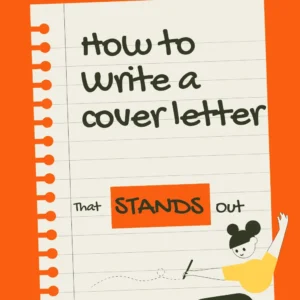We often get questions from prospective candidates about what we think a great cover letter should look like, so we thought we would write a little guide that applicants can refer to if they are struggling with inspiration.
We hope that by following these tips, it will be easier to write an effective and impactful cover letter. This may be the very thing that helps you stand out and finally secure that role!
Especially now that the temptation to use ChatGPT and other AI software to aid in applications is stronger than ever, it’s important not to underestimate how useful it can be to write a cover letter that stands out from the crowd.
First, let’s address the elephant in the room: the use of AI software when writing cover letters.
There are undoubtedly pros and cons to making use of these tools. The pros include increasing the speed and ease in which one can produce a professional piece of writing with minimal errors, as well as the ability to efficiently discuss key concepts and seamlessly use one’s desired key words.
The cons, on the other hand, include the danger of producing an impersonal piece of work. If applicants are over-reliant on the generic concepts provided by the software, their cover letter will struggle to stand out amongst a pool of qualified candidates who also applied for the position. Also, as the quality of AI-generated content depends on what the software is “fed”, it may not fully grasp the nuances of the industry and/or of the job you are looking to apply to, or offer irrelevant or inappropriate content as a consequence of misinterpreting a prompt.
As for applications to Accutrainee roles, we understand the value of innovation and appreciate that if used appropriately, AI can be a supporting tool for individuals to more clearly express their perspective, overcome accessibility challenges, and structure their reasoning in a way that is more in line with what they would like to convey. However, while we don’t have restrictions on the use of AI, we still want your cover letter to have a personal tone and unique elements – we want you to tell us your story, and for you to showcase your experiences and career path from your individual point of view.
While we accept the use of this type of tool, please note that every organisation is different. Therefore, it’s always recommended to research whether the firm/organisation you are applying for has specific views, policies, or restrictions around the use of AI in the application process.
Now let’s discuss what the content of a good cover letter could include. It doesn’t need to have any dramatically sophisticated elements to it – what most recruitment teams are looking for is authenticity, passion, and commitment.
A cover letter is a great opportunity for candidates to express their personality and main interests, to share what inspires them and motivates them to pursue a career in the legal industry. It’s a means of letting one’s passion for law shine through, and of telling recruiters about their background, their story, and their career journey up to the point of application.
You may want to use the cover letter to tell your prospective employer about the reasons why you decided to start a career in law, what your main achievements in the academic, work, or personal sphere have been, as well as mentioning any other instances where you demonstrated excellence. These topics can be leveraged to showcase how you would be able to add value to the role you are applying for, and also to lay out the reasons why you would like to join a specific team or company, and what you would like to learn from them.
The cover letter can also be a way of highlighting your interest for specific areas of law, or for working in a specific type of organisation, team, or environment. You would then explain why you are drawn to a certain context and what you would like your career to look like.
Finally, there may be some specific questions within application forms, that are separate from the cover letter itself. You should never copy and paste the cover letter (not a section neither its entirety), but rather use this opportunity to articulate topics more in depth, to show that you have engaged in the appropriate amount of research and self-reflection, and that you are truly committed to the role you are applying for.
Of course, attention to detail is also paramount if you want to make the best impression. Ensure that your writing has no typos or spelling mistakes, that your sentence structure and paragraphs are flowing well, and that you are discussing details that are relevant to the company and role you are applying for. Aside from the usual care in addressing the cover letter to the correct organisation or employee, and writing the name of the organisation correctly, applicants should also be mindful of mentioning areas of law or initiatives that the firm is not involved in. We all have template structures that we use when writing, but the real task is to impeccably tailor these to the place you are applying for.
..and that’s it really! We know it may feel daunting to write something about yourself, often with little experience and support, but each one of us has a unique story, background, and experience, and cover letters are a great opportunity to shine a light on your personality, your goals, your experiences, and all the skills you learned along the way that you will be able to bring to your new role.



